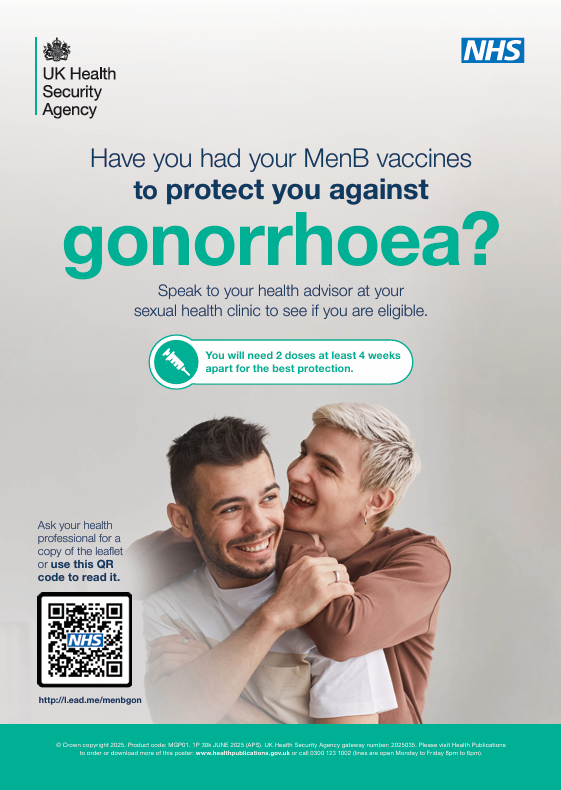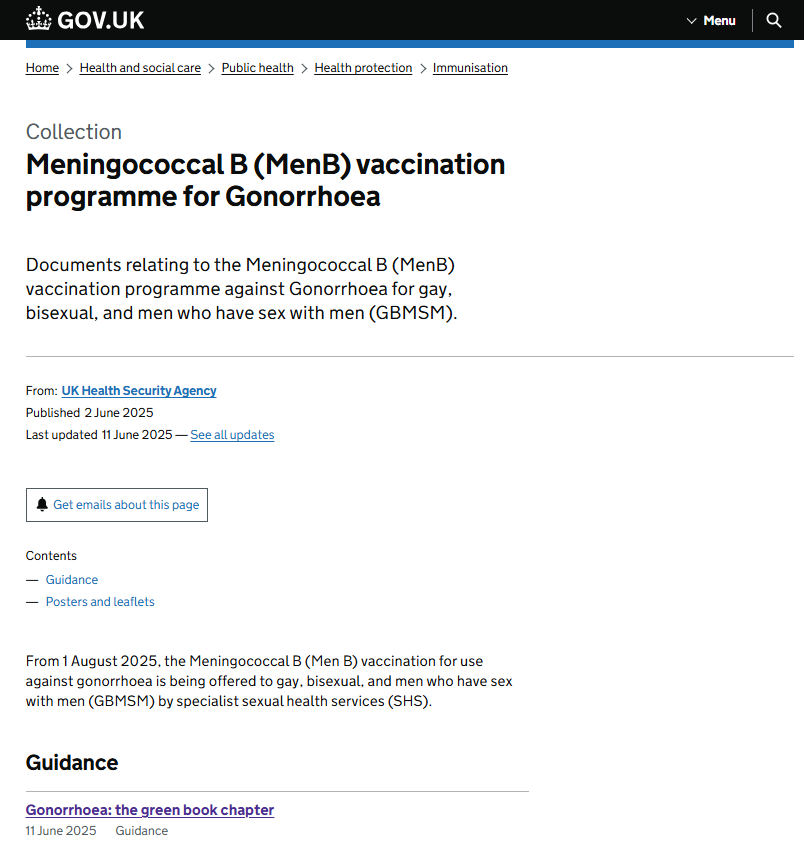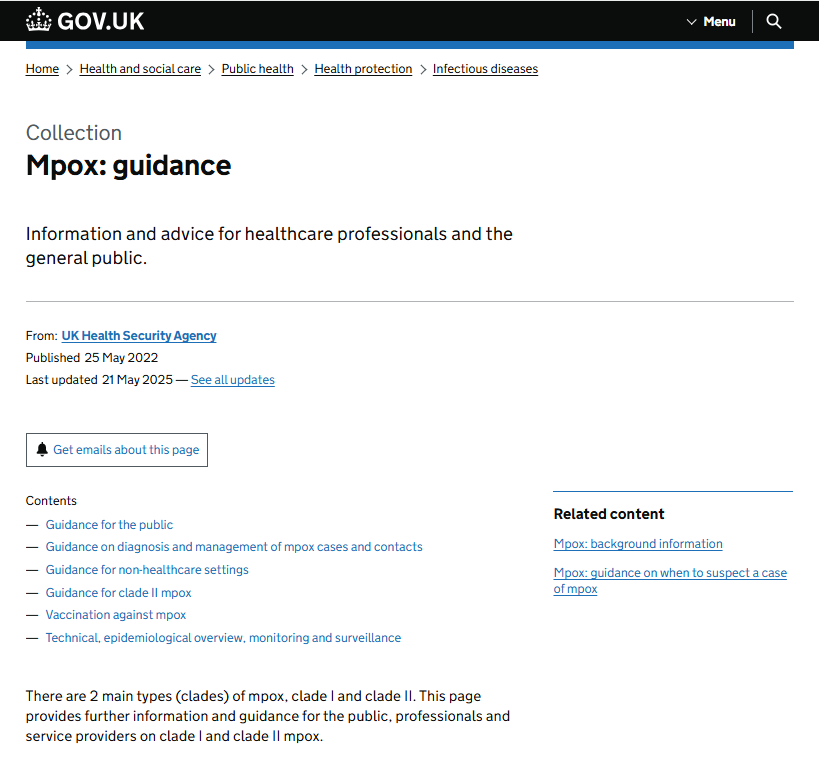
NHS England has announced that the UK Government has accepted the Joint Committee on Vaccination and Immunisation (JCVI) recommendations and has announced the implementation of two new routine vaccination programmes starting in August 2025, targeting Mpox and Gonorrhoea. These initiatives aim to protect high-risk populations and curb the spread of these infections. It comes amid a record high of 85,000 gonorrhoea diagnoses in England in 2023 – 3 times higher than in 2012. As healthcare providers, understanding the operational details is crucial for effective delivery.
For further guidance on the JCVI recommendations healthcare providers should review the following JCVI statements:
- Mpox Vaccination: A routine pre-exposure vaccination programme:
- Gonorrhoea Vaccination: A routine opportunistic vaccination programme, marking a global first in combating this STI.
Programme start dates

Both programmes are set to commence on 1 August 2025, with all providers expected to be operational by 1 September 2025 with once contracts are in place, staff are appropriately trained and vaccines are in stock (available from ImmForm). These programmes will be delivered through local authority – commissioned sexual health services.
Eligibility Criteria
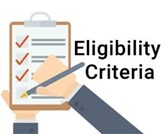
The JCVI advised that the vaccination programmes, which have similar eligibility criteria, should primarily target gay, bisexual and other men who have sex with men (GBMSM) who meet the eligibility criteria and are at highest risk of exposure to these infections. There may also be a small number of individuals other than GBMSM with a similar incidence of infection as the eligible GBMSM groups who may be offered the vaccines.
Individuals should be identified through sexual health services, using markers of high risk of infection, including a recent history of multiple sexual partners or recent bacterial sexually transmitted infection.
Full details on the eligible cohorts for each programme will be made available in the Mpox and Gonorrhoea chapters of the Green Book.
Eligible people will also be offered hepatitis A and B and human papillomavirus (HPV) vaccinations when attending their appointment for the gonorrhoea vaccine or Mpox vaccines. (NHS England 21st May 2025)
What is Mpox and Gonorrhoea?

Mpox
Mpox, caused by the monkeypox virus (MPXV), is a zoonotic disease related to smallpox. Human cases were first identified in 1970, with outbreaks primarily in Central and West Africa. Transmission occurs through close contact with lesions, body fluids, respiratory droplets, or contaminated materials. The incubation period ranges from 5 to 21 days, typically 6 to 13 days. While most cases are mild, severe illness can occur, especially in children, pregnant women, and immunocompromised individuals. The Green Book 2025
There are two genetic clades of MPXV:
- Clade I: Associated with more severe disease and higher mortality rates.
- Clade II: Typically causes milder disease; Clade IIb was responsible for the 2022 UK outbreak.
In the UK, the Modified Vaccinia Ankara – Bavarian Nordic (MVA-BN) vaccine is offered to people considered at high risk. MVA-BN is sold under two trade names; Imvanex in the UK and Jynneos in the US. The MVA vaccine uses a much weakened form (attenuated) of a pox virus called vaccinia to induce an immune response. The Mpox vaccine can be given either before exposure to the virus, or after an exposure. Vaccine Knowledge Project 2025
Gonorrhoea

Gonorrhoea is an Sexually Transmitted Infection (STI) passed on through sex and if not treated, can cause serious health problems such as and infections in the eyes, testicles or prostate.
It is the second most commonly diagnosed STI in England, but not everyone gets symptoms of gonorrhoea. Symptoms include a burning pain when you urinate, fluid or discharge coming out of your genitals, and pain in your testicles or lower abdomen.
Symptoms usually start around 2 weeks after infection, but an infected person may have no symptoms and can still transmit the infection NHS England 2025
People who receive the jab – an existing vaccine for meningococcal B disease, 4CMenB – could be protected from gonorrhoea by up to 40% and help tackle the increasing levels of antibiotic resistant strains of the disease, according to UK Health Security Agency (UKHSA) research.
Analysis led by Imperial College London has suggested the vaccine known as 4CMenB could avert up to 100,000 cases of gonorrhoea and save the NHS over £7.9 million over the next decade, if high uptake is achieved and an ongoing programme is confirmed. NHS England 2025.
Meningococcal B Vaccine

The Meningococcal B vaccine – 4CMenB is a 4-component serogroup B meningococcal vaccine. The only licensed vaccine currently available in the UK is the Bexsero® which is manufactured by GDK, and authorised for the prevention of meningococcal disease in individuals aged 2 months and older. It is currently used in the routine childhood programme.
Preparing for the Introduction of the programmes.
- Regional commissioners should now start working with integrated care boards and local authorities (including directors of public health) to commission sexual health service providers to deliver the routine programmes.
- In planning the services, partners should consider how commissioning and operational delivery can be aligned with other vaccination programmes in sexual health services. All sexual health services providers should be engaged in plans to consider how they could offer the programmes to ensure effective programme coverage and equity of access. There may be exceptional circumstances where the service offer is consolidated locally.
- Commissioning will be through direct award process B under the Health Care Services (Provider Selection Regime) Regulations 2023. Funding for these programmes has been made available, and regional commissioners will confirm payment arrangements based on local agreements.
NHS England and the UK Health Security Agency will publish further operational and clinical guidance to support these vaccination programmes in the coming weeks.
Staff training:
Healthcare providers should plan to train staff appropriately to administer the vaccines and manage the programmes. To find out more about National Minimum Training standards providers should follow the guidance in the PHE (now UKHSA) 2018 guidance document
To book a New Immunisers’ (2 day) Foundation course for new vaccinators find dates and availability here:
To book annual updates for trained vaccinating staff find dates and availability here:
Next steps
- Stay Informed: Await further operational and clinical guidance from NHS England and the UK Health Security Agency, to be released in the coming weeks.
- Monitor Updates: Keep abreast of updates to the Green Book for detailed eligibility criteria and programme specifics.
By proactively preparing for these programmes, healthcare providers can play a pivotal role in reducing the incidence of Mpox and gonorrhoea, safeguarding public health, and addressing the challenges posed by antibiotic-resistant strains.
For more detailed information healthcare providers and practitioners are encouraged to refer to the official NHS England publications: Action needed for delivery of routine Mpox and gonorrhoea vaccination programmes 2025.
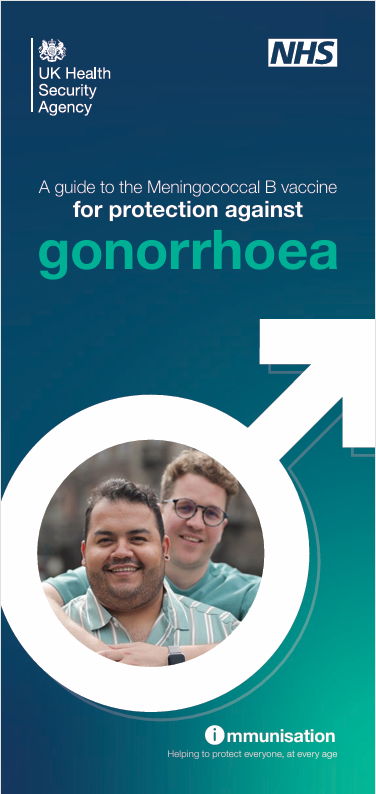
Useful resource: Leaflet
Useful resource: poster
